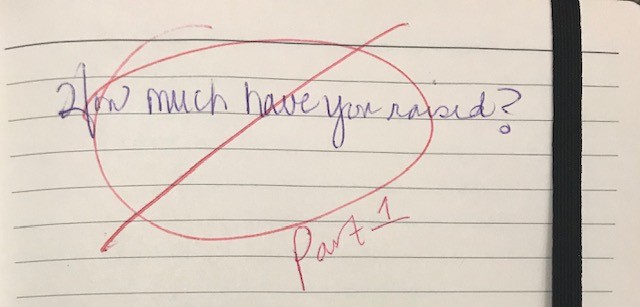
How much money have you raised?
Maybe you had to answer this in an interview. Maybe you had to ask it. I don’t like it. Never have. Never will.
My consulting business doesn’t toss out a criticism without a solution. But before the solution, let’s explore why that question is a bad one.
1) The first emphasis is on money.
2) The second is on you.
Why is emphasizing money a problem? My four big reasons:
· It doesn’t consider strength of portfolio. Candidate A manages a portfolio at an institution or nonprofit with donors and prospects of high net worth. But does the fact that he or she raised, say, $1,000,000, mean more than Candidate B who raised $50,000 from a small organization?
· It doesn’t consider the strength or cultivation level of the territory. Candidate C may have been the beneficiary of a territory that’s been cultivated for years. Thus, he or she may have raised more money than the candidate who has been working in a new territory. Right place, right timing.
· It doesn’t consider the pipeline. Candidate D may currently be seeking larger donors for a campaign, while Candidate E could be working at an organization that just completed a campaign.
· It can exclude unconventional candidates. What about Candidate F, who has the right skill set but has been in another area of advancement – or even in a different field altogether?
Now, why is it a problem to ask about you? My top three reasons:
· “You” are not an institution. The word you implies only you played a role in raising money. But going one step deeper, it can reveal that a candidate thinks he or she alone raised the money. Stay tuned…I’ll talk about nurturing staff culture in Part 2.
· “You” are not a team. Has Candidate A taken over a portfolio where another staff member cultivated the gift, then moved on or was promoted? While by some definitions, the candidate raised the money, did they really?
· ”You” lead a team. What about Candidate B, who managed staff with some major gift responsibilities? Does he or she count what her staff raised as well?
Do you weed out a candidate based on the amount of money raised? Consider these other questions as a better option to get to the heart of your candidates:
· Describe how you work with a team to secure support from a prospect or donor.
· How do you build a relationship with a prospect, especially one who has been engaged for a long time?
· In what case would you suggest to your supervisor that there may be a better fit on staff for a donor in your portfolio?
· Give an example of a gift you are most proud of.
· When should you make the ask?
· How do you position an organization for the next person who will work with your portfolio?
· How do you respond when you hear “no?”
· How do you listen to determine a donor prospect’s interest in making a major gift?
If you ask a candidate “how much have you raised?” then you could be placing a good candidate on the defensive from the get-go. Reconsider asking that question and opt for ones that dive deeper into the way a candidate operates.
